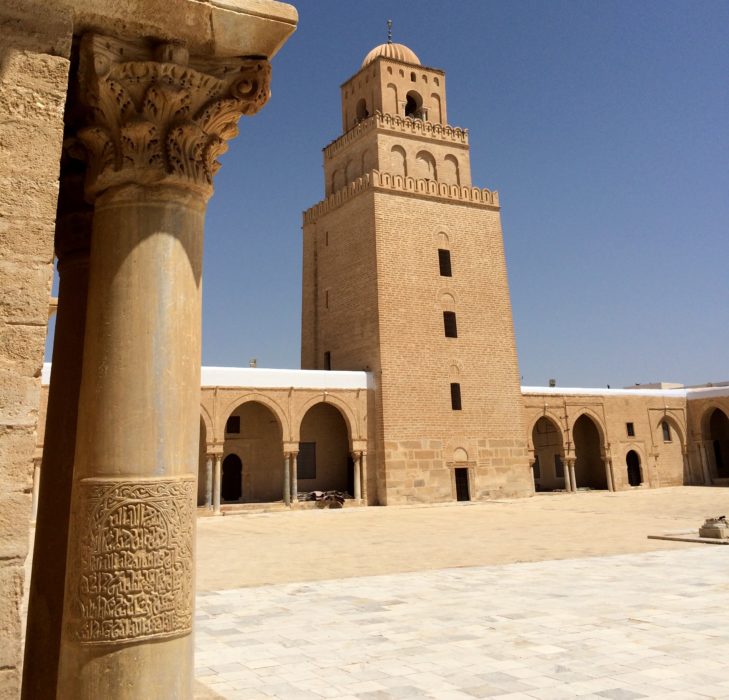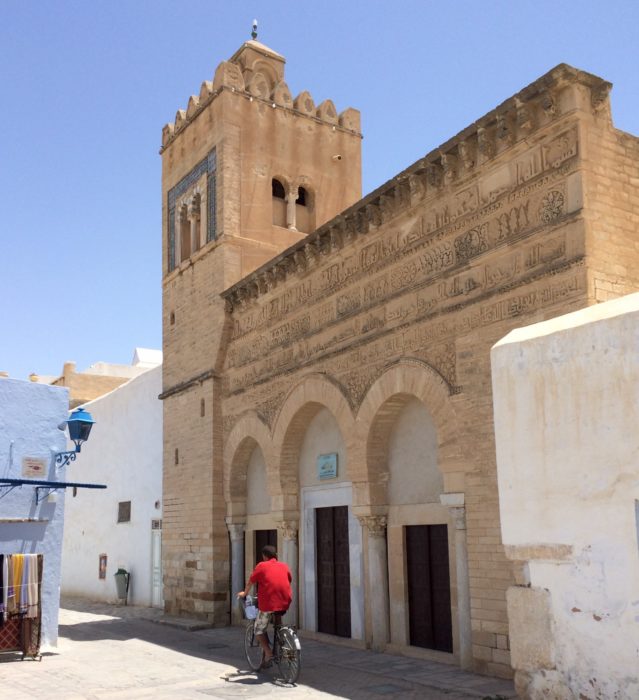4th July 2017 Tripoli, Libya
Tolerance and Coexistence
Last week I had the opportunity to visit Kairouan, a Tunisian city that has been a centre of scholarship and Islamic science for hundreds of years. With some of the scholars, we talked about tolerance and co-existence, values that the city and its university have been promoting for generations.
The city was founded in 670 AD by an Arab general Oqba ibn Nafi. The location was favoured because it was in the middle of a plain, a long way from the danger of attack from the sea and from the hostile tribes in the Tunisian mountains.

In the 8th century, under the Aghlabid dynasty, the city became famous for its wealth and prosperity. They built the Great Mosque, traders’ palaces and a complex system for transporting and storing water. It became the capital of Ifriqiya, the province that gave its name to the continent of Africa.
The Great Mosque is a most impressive building with 414 marble and granite columns, many of which are the remnants of Roman ruins. At one time it was forbidden to count the columns on pain of blinding.
The founders of the mosque also set up a university that attracted Islamic scholars and students of Koranic learning. For many Muslims, the city and the mosque were considered to be the 4th holiest site in Islam. The city has also played a role in crafting the history and identity of Tunisia as a nation.
We were able to walk through the city – despite the heat of the mid-day sun – and visit the Mosque of the Three Doors and the Mosque of the Barber. The winding streets with their ornate doors and cool courtyards exuded an atmosphere of history and quiet self-confidence.
We sat with the imam of the Great Mosque and the heads of the Centre of Islamic Studies. In addition to offering us some tasty makroudh (a biscuit made of semolina and dates soaked in honey), we had a fascinating discussion about extremism.
They described the role of Kairouan in spreading Islam in North Africa and in promoting tolerance and coexistence. They regretted that Tunisians had been involved in terrorism and extremism – including in Libya – and focused on the need for better education, teaching of the values of Islam and economic opportunity.
On education, they underlined the need to encourage critical thinking as a way to avoid rigid, unquestioning beliefs and respect for the views of others. They were concerned that, in the absence of proper teaching of Islamic values, young people would be attracted to extreme ideas that have nothing to do with the true values of the religion.

I was struck by the relevance of this debate for the United Kingdom. After terrorist attacks in Manchester, London Bridge and Finsbury Park, the need to tackle extremism is top of the agenda. Prime Minister Theresa May has stressed that there has been far too much tolerance of extremism: enough is enough.
Almost 5% of the UK’s population are Muslim. And many towns and cities have large Muslim communities. They want to get on with their lives, educate their children and live in safety – like everyone else. Only a very tiny minority have been radicalised, some travelling to fight with terrorist groups in Syria and Iraq.
The principles of tolerance and coexistence which we learned about in Kairouan could offer useful experiences for Britain, as we learn to recognize our common values, live as united communities and try to eradicate violent extremism from threatening our security and prosperity.
I was deeply impressed by Kairouan. We have a lot to learn from each other in preventing the spread of extremism and eradicating terrorism. We can build on our common values of tolerance and coexistence to counter the people who promote division and hate.